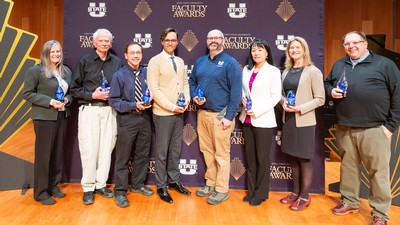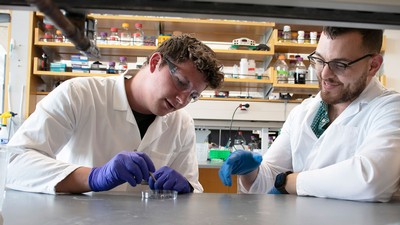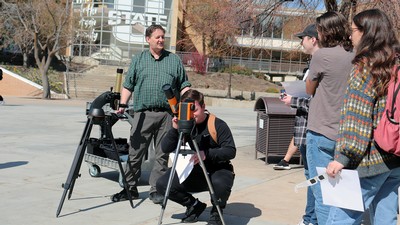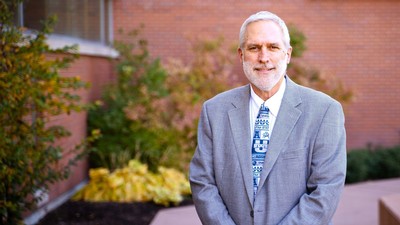BBC4 asks USU Philosophy Prof to Take on 'Paradox' of our Real 'Selves'
By Janelle Hyatt |
Philosophy Professor Charlie Huenemann was asked by BBC radio to explain centuries-old 'thought experiment' about whether our true selves endure over time.
If you’re seeking an answer to the most important question in the galaxy, you might track down wise, old Gandalf. He is, after all, a wizard.
Or, BBC Radio has another suggestion: his twin, “Gandalf with glasses.” That’s how Philosophy Prof. Charlie Huenemann described himself in a recent interview with the BBC. His students over the years agree with this label.
So, what is the question universally asked, especially by science fiction devotees? It’s this: When Capt. Jean-Luc Picard beams aboard the Enterprise, do the carbon atoms that make up his body make the leap, i.e., are the molecules compressed into a data stream?
Or is he basically replicated aboard ship using his cellular coding, memories and other neural impulses — basically a blueprint of “him”?
That exact inquiry was made on “Naturebang,” a BBC Radio4 program in which, according to its website, “science meets storytelling with a philosophical twist.”
Huenemann recorded the interview with the London hosts at the Utah Public Radio studio. You can listen to it at the link below.
The program’s hosts were inspired by, of all things, a sea sponge (otherwise known as a loofah”). In a weird scientific phenomenon, when a sea sponge is put through the grinder (literally) and made into mush (literally), it reassembles itself (literally). It may take a few days, but all the stray atoms combine to remake the creature into what it was before.
Thus the question, Is it really the same sea sponge? In other words, the radio hosts wondered, are we humans merely a prearranged collection of atoms?
Luckily, they found Huenemann, a philosopher and groupie of all great queries. He’d written an article in Aeon, an international digital magazine focusing on culture and ideas, that asked the same question. He titled the piece, “If I tele-ported from Mars, does the original me get destroyed?”
Currently, humans can’t actually test this, so we’ve relied on science fictional speculation.
“The world of science fiction has been playing with the idea of teleportation devices since the late 19th century,” said host Emily Knight during the broadcast. “And as long as the idea's been around, it's been messing with philosophers.”
So, of course, philosophers like Huenemann are eager to take on this “thought experiment,” commonly known as the “transportation paradox.” And, of course, Huenemann said in a later interview, share it with students.
The thought experiment goes like this: “I'm stranded on Mars,” says Huenemann. “The fuel tanks for my return vessel ruptured, and no rescue team can possibly reach me before I run out of food. But, luckily!, my ship has a teleporter machine which scans my body and produces an amazingly detailed blueprint that is beamed back to Earth, where a new me is constructed using raw materials that are available there on Earth. All I have to do is step in, close my eyes and press the red button.”
Far away on Earth, the space traveler appears, steps off the teleporter, enjoys a shower and eats a home-cooked meal for the first time in ages.
Rationally, says Huenemann, “I can see why this should work because I'm just a particular configuration of carbon molecules. So long as they’re all organized in the same way, it shouldn't matter.”
But what about the scene on Mars? There, a duplicate (or the same) individual walks out of the telemeter, destined to starve? This is the question he poses to students.
“It’s a paradox,” said Huenemann, “because it throws up a question: Does the machine transport you across the universe? Or, does it kill you and make a new version of you on Earth with all your memories and personality intact?”
A Question for Philosophy
This cosmic conundrum become a philosophical question because it’s basically asking, is there an “enduring” self that stays the same over time and space?
Students, when confronted with the thought experiment, are likely to say something like “You’d be both people. You’d be the person on Mars, and you’d be the person on Earth.”
But, Huenemann challenges them, asking whether these two versions of “you” — one alone and starving, and the other now surrounded by friends — are really the same. “Can one person,” he asks, “experience such very different chains of experience?”
In class, he says, “It’s so interesting to see them grasp for different solutions and, as they think through the implications, realize it's not going to work. They say, ‘If I believe that, then I'm going to have to also believe this uncomfortable consequence in this other case.’”
This paradox has a particularly long history of confounding humans. Ancient philosophers considered the paradox using a ship as a metaphor, but Huenemann’s example is a car, particularly one that’s been repaired time and again.
“Over time,” said Huenemann, “you’ve changed every part of your car, but you still see it as your car because the changes have been gradual. You say, ‘I’ve maintained ownership over this. It’s my car.’”
But what, he asks, if someone had followed you and gathered up all those discarded parts? “What if they collected everything in a garage and then reassembled it all into a car? In some sense, that has a better claim to be your car because it’s all the original parts,” said Huenemann.
Not who, but Where and When
Huenemann the philosopher has concluded that the “matter” of our bodies isn’t that big a deal. A carbon molecule is a carbon molecule. But we each have a personal “blueprint.” Assign your blueprint to any collection of carbon molecules, and you’ll get you — theoretically.
Actually it’s less about the blueprint than it is “the way that structure is engaged with other people and with its environment,” he said. “And that goes back to the point of how much of ourselves, how much of our abilities, are determined, not just by internal intrinsic features, but by our relationships to others as well.”
For instance, Einstein may not have changed the way we think about science if he’d lived a century earlier.
Huenemann, of course, loves thought experiments and presenting them to students. Such mind-twisters “help bring to the surface the presumptions we bring to the situation,” he said. “We learn from thought experiments mostly about the conceptual baggage we bring into a problem.”
Our ability to see ourselves as the same from day to day is a “self-illusion.” But it’s also “a very useful fiction,” said Huenemann. “Without believing in ourselves as the same over time, I don’t know that our society could operate.”
Although each of us changes subtly day to day, he says, “we kind of inherit the obligations of previous cells. So if I made a promise a week ago, I'm still obligated to make good on that promise.”
However, he adds, “there is a deep sense in which I'm not the same thing and not the same person. So you have to kind of live with the fiction of being the same over time. And that's useful and a good thing. But it is a fiction.”
The host, Knight, has the final word in the podcast: “Perhaps being me is as much about where I am than what I am.”
This story was originally published in Liberalis, the magazine of the College of Humanities and Social Sciences.
USU Philosophy Professor Charlie Huenemann discusses an updated version of a 'thought experiment' that dates back to ancient philosophers. The 'transportation paradox' asks, "Is there a 'self' that endures over time?"
WRITER
Janelle Hyatt
Communications Director
College of Humanities and Social Sciences
(435) 797-0289
janelle.hyatt@usu.edu
CONTACT
Janelle Hyatt
Communications Director
College of Humanities and Social Sciences
(435) 797-0289
janelle.hyatt@usu.edu
ADDITIONAL RESOURCES
- - Naturebang, Sea-Sponges and the Illusion of Self
- - Aeon, If I Teleport from Mars, Does the Original me get Destroyed?
TOPICS
Society 503stories Humanities 117stories Culture 75storiesComments and questions regarding this article may be directed to the contact person listed on this page.






